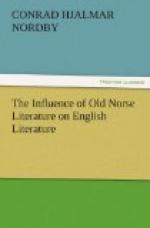EDMUND GOSSE (1849-).
Among contemporary English poets who have taught the world of readers that things Norse are worthy of attention, is Edmund Gosse. He has been more intimately connected with the popularization of modern Norwegian literature, notably of Ibsen, but he has also found in Old Norse story themes for poetic treatment. We mention “The Death of Arnkel,” found in the volume Firdausi in Exile, more because it shows that our poets are turning to the gesta islandicorum for themes, than because it is a remarkable poem. More pretentious is King Erik, a Tragedy, London, 1876. Here is a noble drama which displays an intimate acquaintance with the literature that gave it its themes and inspiration. The author dedicates it to Robert Browning, calling it:
... this lyric symbol of my
labour,
This antique light that led my dreams so long,
This battered hull of a barbaric tabor,
Beaten to runic song.
I have often thought that fate was very unkind to keep Browning so persistently in the south of Europe, when, in Iceland and Norway, were mines that he could have worked in to such supreme advantage. To be sure his method clashes with the simplicity of the Old Norse manner, but from him we should have had men and women superb in stature and virility, and perhaps the Arctic influence would have killed the troublesome tropicality of his language.
This drama by Gosse is not strictly Icelandic in motive. Jealousy was not the passion to loosen the tongue of the sagaman, and in so far as that is the theme of “King Erik,” the play is not Old Norse in origin. Christian material, too, has been introduced that gives a modern tinge to the drama, but there is enough of the genuine saga spirit to warrant attention to it here. Something more than the names is Icelandic. Here is a woman, Botilda, with strength of character enough to recall a Brynhild or a Bergthora. Gisli is the foster-brother that takes up the blood-feud for Grimur. Adalbjoerg and Svanhilda are the whisperers of slander and the workers of ill. Marcus is the skald who is making a poem about the king. Here are customs and beliefs distinctly Norse:
I
loved him from the first,
And so the second
midnight to the cliff
We went. I mind me how
the round moon rose,
And how a great whale in the
offing plunged,
Dark on the golden circle.
There we cut
A space of turf, and lifted
it, and ran
Our knife-points sharp into
our arms, and drew
Blood that dripped into the
warm mould and mixed.
So there under the turf our
plighted faith
Starts in the dew of grasses.
(Act. IV, Sc. II.)
But all day long I hear amid the crowds,
. . . . . . . . .
A voice that murmurs in a
monotone,
Strange, warning words that
scarcely miss the ear,
Yet miss it altogether.




